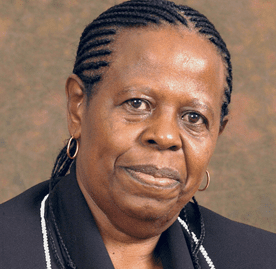“With all the numerous efforts for easing the plight of marginalised groups, including women, we seem to make very small strides. Women continue to struggle, be it in education, employment and financial standing,” said Deputy Minister of Water and Environmental Affairs, Rejoice Mabudafhasi, at a Gender, Water and Development workshop held on 5 September 2013 in support of the African Ministers’ Council on Water (AMCOW) Gender Strategy.
According to Mabudafhasi, it is not all “doom and gloom” though, with local initiatives such as the Adopt-a-River campaign being held up as examples of positive development. In addition, she added that there “is an international consensus to treat gender as a precondition for the achievement of social and economic development objectives,” with AMCOW perceiving gender equality and women’s empowerment not only as a human rights issue, but as a pathway to achieving the Millennium Development Goals (MDGs) and ultimately sustainable development. While progress had been achieved in providing access to water and in the management of water resources, Mabudafhasi said it was specifically women’s inclusion in the decision making about water development and management – “from the lowest to the highest level” – which is still lagging behind. “The gender gaps have increased in a changing physical, political and economic landscape with increasing competition for scarce land and water resources, necessitating innovative solutions to the gender, class and race divides.”Mabudafhasi said that the workshop was a means of sharing and taking stock of the cooperation and potential partnerships which could create the desired impact on women’s lives in Africa. “Many implementing agents are already putting plans forward for implementing the AMCOW gender strategy.”
Research essential Despite the above gains made, research on the different gendered uses of water is still fragmented and the possible influence thereof on policy making and implementation strategies largely unfathomed, according to Mabudafhasi. “The pace of gender research and civil society and policy advocacy for gender equality in the water sector is therefore slow and exacerbated by a scarcity of funding, while an urgent need to build out the limited research skills capacity in this sector has been identified.” As a result, the Deputy Minister noted that the Water Research Commission (WRC) of South Africa, in partnership with the South African Department of Water Affairs (DWA), the Southern Africa Development Community (SADC), the International Organisation of the Women for Water Partnership (WfWP) and AMCOW would be hosting a conference on gender and water in the hopes of addressing this need. The Gender and Water Conference will be hosted in East London from 19 to 21 February 2014.






